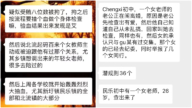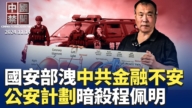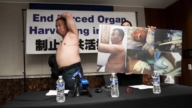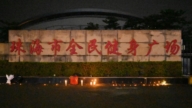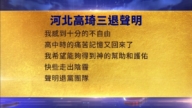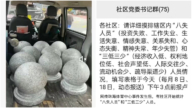【新唐人2013年11月08日訊】中共前黨魁毛澤東秘書李銳,在香港出版了新書《李銳口述往事》。10月29號,他的女兒李南央一家由香港到北京機場入境,行李在入關後被海關人員要求開箱檢查,其中53本《李銳口述往事》和一些刊物,被海關作為禁書扣留。
《李銳口述往事》被北京海關作為禁書扣留,這本書的著作權人李南央,已全權委託北京市「華一律師事務所」夏霖和夏楠兩位律師辦理。
現年96歲的李銳,是著名的中共黨史專家,曾任中共中央委員,中共中央組織部副部長,水電部副部長,同時也是毛澤東兼職秘書。他被稱為開明派元老,晚年以敢言著稱,長年呼籲民主憲政。
做為李銳的女兒,李南央10月30號公開致信海關,她在信中表示,「他(李銳)的回憶錄是珍貴的歷史資料,國外研究中國問題的機構評價極高,認為是做研究的寶貴史料。」因此,她期待返美時,北京海關能將書籍歸還,允許她帶往美國,以作史料研究之用。
李銳的妻子表示,不明白中共當局為何如此懼怕李銳的書籍。
中共第12屆中央委員李銳太太:「理由多了,現在他們又不告訴咱們,哪有那麼容易解決,解決不了,就等著吧。」
前《湖南人民出版社》總編輯朱正為這本書寫序,他認為這是一本傳記文學作品,提供了許多生動的細節,使人們對當年的歷史能夠有一個更具體的了解。
加拿大作家盛雪:「中共對所謂禁書的標準,應該是跟今天的整個世界的普世價值,是完全相反的,我們知道在民主國家,根本就沒有所謂的禁書,或者是被禁查的消息、新聞等等,它只有對色情和暴力的一種限制。」
李南央在整理編輯《李銳口述往事》後記中表示,要總結教訓,首先得讓人了解有過哪些教訓,讓人知道共產黨都犯過哪些錯誤!這本《口述》只能在香港出版,當然令人感到悲歎。
盛雪:「李銳他做為一個原中共高官,他顯然是知道不少事情,他後來到了老年的時候,他的確在這方面是一個有勇氣、有良知的人,他把這些事情,這些歷史背景真相書寫出來,那麼這些書不可能在中國境內出版,只能在境外出版,不僅僅是給中國國內的讀者。那麼就算他自己有保留的價值,也不應該受到扣查的。」
《李銳口述往事》記述了李銳的一生經歷,特別是在「延安整風」運動中被關押審查,李銳使用大篇幅來記錄這段歷史。
李銳書中說,不認真反思「延安整風」,直到現在仍將過去的種種錯誤蒙蓋起來﹔還是要用「槍桿子、筆桿子」治天下﹔而政治體制改革僅說說而已﹔依舊不准實現言論自由、出版自由等憲法規定的條款,實在令人痛心無已!半個多世紀前的錯誤做法延續至今,實為不總結教訓的必然結果。
書中也談到中國政治體制的改革,李銳說道,「中國的根本問題,還是要解決黨的問題。黨政要絕對分開。國家政權是國家政權,政黨是政黨。現在黨的官員權力高於一切,高於政府,高於法律,政府與法律都是附屬於黨。這個問題不解決,市場經濟是搞不好的。現在搞出的是權貴資本主義,問題更明顯了。」
李銳在上世紀80年代也曾反對「三峽工程」。在江澤民及胡錦濤主政期間,多次上書力促改革和民主。
中國資深媒體人高瑜向《德國之聲》表示,北京海關應該是有針對性的對李南央進行所謂的「禁書檢查」。高瑜說,自早年間,李銳持續上書力促當局改革後,他已經逐漸不被當局見容,透過海關將他的著作扣押一事,可以看到當局當前對黨內民主人士、和異議人士等進行的思想封鎖。
採訪/朱智善 編輯/黃億美 後製/陳建銘
Memoir of Li Rui, Mao’s Secretary: Chinese Communist Party Is China’s Problem
Li Rui, once Mao Zedong’s secretary, recently published
Li Rui’s Oral Memories in Hong Kong.
On October 29, his daughter, Li Nanyang arrived at Beijing
airport from Hong Kong.
Upon custom check, 53 copies of the book were confiscated
along with other articles.
Li Rui’s Oral Memories was confiscated by Beijing Customs
for it being a banned book.
Li Nanyang, as the copyright holder of this book, has
entrusted Beijing Huayi law firm lawyers Xia Lin and Xia Nan on this case.
The 96 year-old Li Rui is a famous Chinese Communist Party
historian.
He held the post of CCP Central Committee, deputy head
of the Organization Department, vice minister of the Ministry
of Water Conservation, and he was one of Mao Zedong’s
secretaries.
He was called “the liberal veteran party member.”
In his later life, he has become a vocal advocate
of democratic reform in China.
His daughter, Li Nanyang wrote an open letter to customs
on October 30.
She states, “His memoirs are valuable collections of history
and highly recognized as valuable references
by foreign research institutions on China issues."
Therefore, she hopes the Beijing Customs will return
the books when she returns to the US,
as she needs them for research.
Li Rui’s wife could not understand why the CCP authorities
feel uneasy about Li Rui’s book.
Li Rui’s wife: “Too many reasons but they won’t tell us.
We’ll just see how it is going to get resolved, it will be hard."
Zhu Zheng, former Hunan People’s Publishing House editor,
wrote the preface for the book.
He considers Li Rui’s memoir to be biographical literature
which provides many vivid details
for a concrete understanding of history.
Sheng Xue, Canadian writer: “The CCP’s standard for
a banned book is the opposite of the world’s universal values.
There are no banned books or news in a democratic country,
but restrictions against pornography and violence."
Li Nanyang wrote a postscript for the memoir.
She states, “To learn a lesson, one must understand
the lesson.
People need to know the mistakes the CCP has made.
Lament, for this memoir is only available in Hong Kong.”
Sheng Xue: “As a veteran party official, Li Rui obviously
knows a lot.
At old age, he can be regarded as a courageous
and conscientious person to write these historical facts.
Even though these books are banned in China,
they are published outside of China for people in the world.
For the sake of keeping it themselves,
these books should not have been confiscated."
Li Rui’s memoir chronicles his life experience.
He reflects greatly on the “Yan’an Rectification"
campaign when he was detained and interrogated.
Li Rui states in the book, “Refuse to reflect seriously
on the Yan’an Rectification Movement,
and continue to cover up all mistakes;
insist on ruling with the gun and pen;
political reform remains talk;
prohibit constitutional provisions such as the freedom
of speech and freedom of the press, it is really sad.
Mistakes and conducts for more than half of a century ago
continue to date.
It is the inevitable consequence of not learning
from lessons.
Li Rui also talks about the political reform in his memoir.
“China’s fundamental problems rely on solving
the party’s problems.
Government and the party have to be absolutely separated.
State power remains as state power,
and political parties are political parties.
Nowadays the party officials are superior to everything else,
the government and the law.
Government and laws have become the affiliate of the party.
Without solving this, there will be no market economy.
As a result, the crony capitalism says it all," he writes.
Opposed to the Yangtze Three Gorges Project in the 1980s,
Li Rui had sent multiple letters to Jiang Zemin and Hu Jintao
during their posts urging for reform and democracy.
Gao Yu, senior journalist, told Deutsche Welle that Beijing
Customs’ conduct was specifically targeting
Li Nanyang on the banned books.
He explained that since Li Rui called for reform
in the early years, he has been regarded
as intolerable by the authorities.
Confiscating his books only shows how the party has been
blocking ideology from activists and dissidents.
Interview / Zhu Zhishan Edit / Huang Yimei post-production


